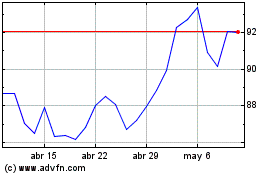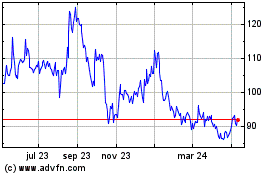Mixing and Matching Covid-19 Shots in Fully Vaccinated People Is Subject of New Study
01 Junio 2021 - 6:15PM
Noticias Dow Jones
By Peter Loftus
Federal health officials have started a new study exploring
whether mixing different Covid-19 vaccines can prolong immunity and
better protect people from concerning variants of the
coronavirus.
The new study will enroll adult volunteers who have been fully
vaccinated against Covid-19 and give them booster doses of
different vaccines, the National Institute of Allergy and
Infectious Diseases said Tuesday.
NIAID, which is part of the National Institutes of Health, is
leading and funding the study through a network of researchers who
specialize in vaccines and infectious diseases.
"Although the vaccines currently authorized by the U.S. Food and
Drug Administration offer strong protection against Covid-19, we
need to prepare for the possibility of needing booster shots to
counter waning immunity and to keep pace with an evolving virus,"
NIAID Director Anthony Fauci said.
If booster shots are needed, the new study could help determine
the best combination of vaccines, Dr. Fauci said.
The study marks the latest phase in the development of vaccines
and boosters, after companies began distributing doses targeting
early strains of the virus and exploring shots and boosters that
could fight variants.
Studies suggest the currently available vaccines protect against
variants of the coronavirus that have emerged, though perhaps not
as strongly as they protect against early strains. Researchers want
to be prepared to offer booster shots in the event the immunity
conferred by the original vaccines declines over time or a strain
develops capable of evading the current vaccines.
One segment of the early-stage mix-and-match study will involve
about 150 people who have already received one of the three
authorized Covid-19 vaccines in the U.S.: one from Pfizer Inc. and
BioNTech SE, a vaccine from Moderna Inc. and a third from Johnson
& Johnson.
These volunteers will receive a single booster dose of Moderna's
currently authorized Covid-19 vaccine 12 to 20 weeks following
their initial vaccination.
A separate section of the study will enroll people who haven't
received any Covid-19 vaccines. Initially, they will receive the
standard two doses of Moderna's vaccine, and then a booster dose of
a vaccine 12 to 20 weeks later.
The booster dose may be a vaccine that has been designed to
target one of the virus variants of concern, NIAID said.
Some drugmakers including Moderna have begun developing modified
versions of their original vaccines that could better target
variants.
Moderna said last month an early-stage study showed that a
booster dose using a vaccine targeting a variant first identified
in South Africa induced immune responses with more potency against
that variant.
The biotech company also is testing whether a third dose of its
original Covid-19 vaccine helps sustain protection.
Companies and researchers have begun to explore the idea of
mixing and matching various Covid-19 vaccines to see if that
approach improves upon the currently authorized vaccine
regimens.
NIAID said it may add new vaccines to the trial if they receive
authorization for use in the U.S., such as one from Novavax Inc.
that is in late-stage testing.
Researchers will follow study volunteers for one year after they
receive their last vaccination to monitor for safety and side
effects, NIAID said. Researchers will analyze periodic blood
samples from study subjects to assess their immune responses.
NIAID said it expects initial study results in late summer.
Write to Peter Loftus at peter.loftus@wsj.com
(END) Dow Jones Newswires
June 01, 2021 19:11 ET (23:11 GMT)
Copyright (c) 2021 Dow Jones & Company, Inc.
BioNTech (NASDAQ:BNTX)
Gráfica de Acción Histórica
De Mar 2024 a Abr 2024

BioNTech (NASDAQ:BNTX)
Gráfica de Acción Histórica
De Abr 2023 a Abr 2024
